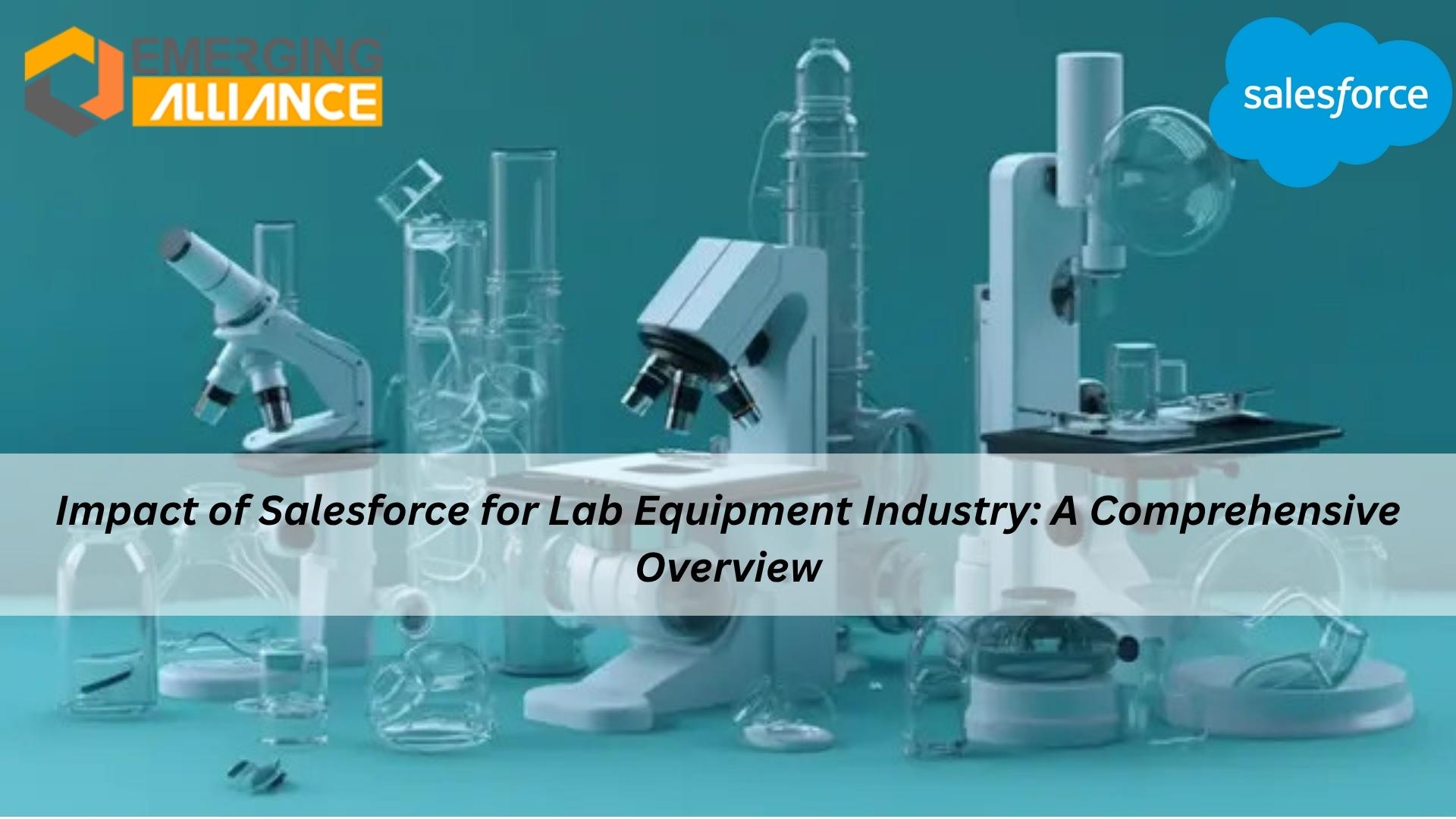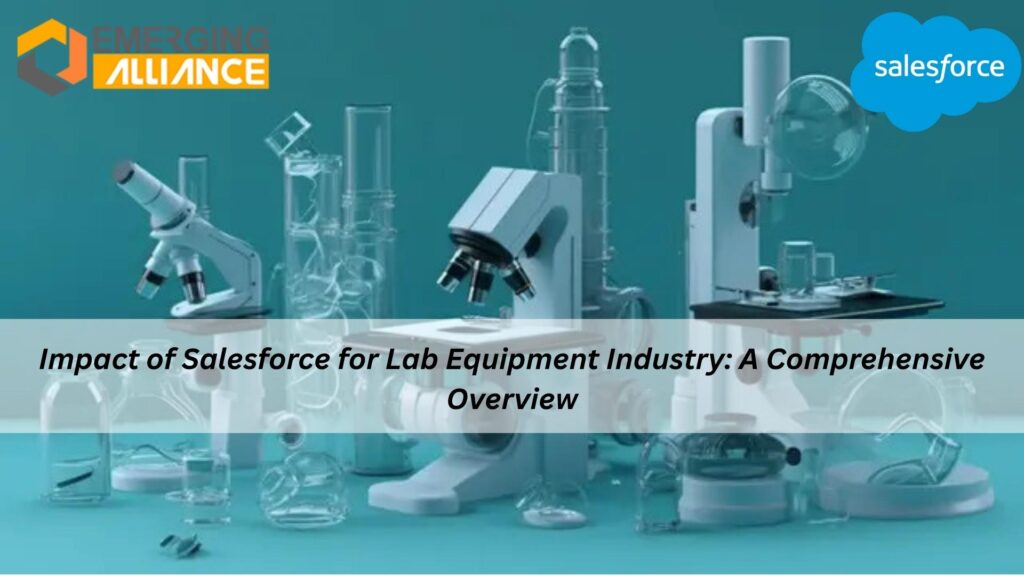
Impact of Salesforce for Lab Equipment Industry: A Comprehensive Overview

How Salesforce for Lab Equipment Industry Starts Shaping Better Outcomes
In today’s competitive and fast-evolving landscape, the Lab Equipment Industry is undergoing significant transformations. Companies in this sector are grappling with numerous challenges — from managing complex inventories to ensuring timely maintenance and support for sophisticated laboratory instruments. As the industry embraces more advanced technologies, Salesforce for Lab Equipment Industry is becoming a game-changer, delivering innovative solutions to streamline processes, enhance customer relationships, and improve overall operational efficiency.
In this blog, we will explore the impact of Salesforce on the Lab Equipment Industry, showcasing how Salesforce’s suite of products, including Salesforce’s Service Cloud, Salesforce’s CRM, and Salesforce’s AI-powered analytics, is reshaping how lab equipment businesses operate and thrive.
At Emerging Alliance, we proudly serve businesses as the Best Salesforce Partner in India. Our expert team provides tailored Salesforce solutions to streamline operations, boost customer relationships, and drive growth.
What Makes Salesforce the Ideal Solution for the Lab Equipment Industry?
Salesforce CRM for Lab Equipment Industry: Optimizing Customer Relationships
One of the key challenges faced by companies in the Lab Equipment Industry is maintaining effective communication and long-term relationships with customers. This includes managing a diverse customer base — from large hospitals and research institutions to small diagnostic labs and clinical laboratories.
Salesforce CRM software offers a robust platform to manage these relationships, providing a 360-degree view of customer interactions. Salesforce allows lab equipment companies to track sales leads, service requests, and customer preferences, enabling personalized engagement and superior customer experiences.
With Salesforce’s cloud-based infrastructure, companies can ensure seamless collaboration among sales, marketing, and support teams. Whether it’s nurturing leads, handling post-sale service, or ensuring timely follow-ups, Salesforce CRM for Lab Equipment helps businesses manage the entire customer lifecycle efficiently.
Salesforce’s Service Cloud with Enhancing Support for Diagnostic Labs
Support and maintenance are critical components of the Lab Equipment Industry. Clinical and diagnostic labs rely on lab equipment that requires regular calibration, servicing, and troubleshooting. Salesforce’s Service Cloud plays a pivotal role in this area by offering a suite of tools designed to manage service requests, track maintenance schedules, and ensure that customers get the support they need in real time.
For example, when lab equipment fails or requires maintenance, the Service Cloud allows technicians to create service cases directly from customer requests, schedule appointments, and even dispatch field agents with the necessary skills and resources. This is a prime example of how Salesforce Field Service for Lab Equipment improves operational efficiency and customer satisfaction.
Additionally, Salesforce for Life Sciences offers industry-specific features that cater to the unique needs of medical and clinical labs, enabling companies to manage compliance, asset tracking, and regulatory requirements in a streamlined manner.
AI-Powered Analytics in Salesforce ERP Driving Data-Driven Decisions
The Lab Equipment Industry thrives on data — from monitoring the performance of devices to tracking inventory and sales trends. Salesforce’s AI-powered analytics, including Salesforce Einstein, provides lab equipment businesses with actionable insights that can drive smarter decision-making.
Using Salesforce’s AI-powered analytics, lab equipment companies can predict demand trends, optimize inventory management, and identify opportunities for cross-selling or upselling based on customer behavior and purchase history. By leveraging these insights, organizations can proactively address issues, predict equipment failures before they happen, and enhance overall business agility.
Salesforce Health Cloud: Tailored for the Medical and Clinical Lab Equipment Sector
With the increasing integration of digital health solutions, many companies in the Lab Equipment Industry are expanding their focus to clinical and diagnostic labs. Salesforce Health Cloud is designed specifically for healthcare providers, offering tailored features that help companies manage patient and equipment data efficiently.
For example, diagnostic labs can benefit from Health Cloud’s ability to integrate patient data with lab equipment usage, creating a holistic view of both patient care and equipment performance. This seamless integration helps optimize workflows, improve patient outcomes, and ensure the accuracy of medical tests and results.
Salesforce Solutions for Lab Equipment Sales Management
Lab Equipment Sales Management is another area where Salesforce plays a crucial role. By streamlining the sales pipeline, automating routine tasks, and offering insights into customer behavior, Salesforce for Lab Equipment Industry helps sales teams close deals faster and more effectively. Salesforce solutions empower sales representatives with the tools they need to track progress, forecast revenue, and provide exceptional service at every stage of the sales process.
Salesforce’s Product Management module and Salesforce’s Automation for Lab Equipment tools allow businesses to manage product lifecycles more effectively, from procurement and pricing to sales and post-sale support.
Integrating with Manufacturing and Inventory Management
Many Lab Equipment Industry players are also involved in manufacturing their products or overseeing a complex supply chain. In these cases, Salesforce for Manufacturing and Salesforce Lab Equipment Inventory Management provide a seamless way to track inventory, manage orders, and optimize production schedules.
Integrating Salesforce with other enterprise tools — such as ERP or supply chain management software — can help lab equipment manufacturers reduce waste, ensure accurate stock levels, and minimize downtime due to equipment shortages.
The Lab Equipment Industry is transforming, and Salesforce solutions are at the forefront of this change. From customer relationship management and field service automation to AI-powered analytics and inventory management, Salesforce offers comprehensive tools that help businesses streamline their operations, enhance service delivery, and boost sales. By implementing Salesforce’s CRM, Service Cloud, and Health Cloud, lab equipment companies can stay ahead of the curve and deliver exceptional value to their customers.
FAQs About Salesforce in the Lab Equipment Industry
1: How does Salesforce CRM for Lab Equipment help businesses grow?
Salesforce CRM helps Lab Equipment Industry businesses by providing a central platform for managing leads, contacts, opportunities, and service cases. This leads to improved customer engagement, better sales conversions, and enhanced support management.
2: What is the role of Salesforce Service Cloud in lab equipment management?
Salesforce Service Cloud for Lab Equipment streamlines maintenance and support processes. It helps businesses manage service requests, track equipment issues, and schedule technician visits, ensuring higher operational efficiency and customer satisfaction.
3: Can Salesforce help with inventory management for lab equipment?
Yes, Salesforce Lab Equipment Inventory Management tools integrate with your system to track and manage stock levels, orders, and deliveries in real-time, improving supply chain efficiency and preventing equipment shortages.
4: How does Salesforce’s AI-powered analytics improve lab equipment sales?
Salesforce’s AI-powered analytics provide businesses with predictive insights into customer buying behavior, allowing sales teams to identify opportunities for cross-selling, upselling, and better inventory forecasting.
5: How can Salesforce for Medical Equipment CRM benefit diagnostic labs?
Salesforce CRM for Medical Equipment enables diagnostic labs to manage customer relationships efficiently, track sales, and service requests, and ensure timely equipment servicing, leading to enhanced customer satisfaction.
6: Can Salesforce help manage product quality in the lab equipment industry?
Yes, Salesforce for Product Quality Management helps lab equipment businesses track product performance, manage compliance, and ensure the equipment meets regulatory standards.
7: How does Salesforce Field Service for Lab Equipment optimize maintenance schedules?
Salesforce Field Service for Lab Equipment allows businesses to schedule service appointments, dispatch field agents, and track maintenance history, ensuring that lab equipment remains operational and compliant.
8: What is the benefit of Salesforce Health Cloud for diagnostic labs?
Salesforce Health Cloud integrates patient and equipment data, helping diagnostic labs manage patient interactions, improve test accuracy, and streamline workflows for better health outcomes.
9: How can Salesforce for Lab Equipment Industry support the manufacturing side of lab equipment?
Salesforce for Manufacturing helps lab equipment companies streamline production, track orders, manage inventory, and ensure timely delivery, boosting manufacturing efficiency.
10: What are the benefits of Salesforce implementation for lab equipment businesses?
Salesforce implementation allows lab equipment businesses to automate processes, improve data management, and enhance customer service, leading to greater operational efficiency and higher customer satisfaction.



